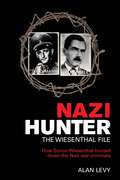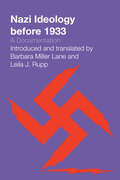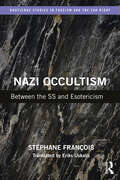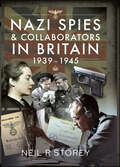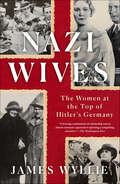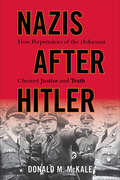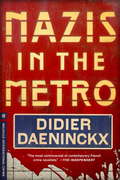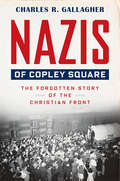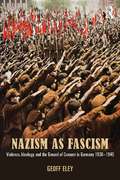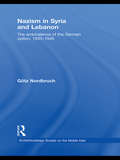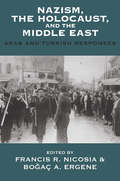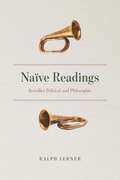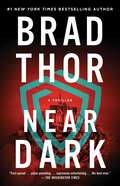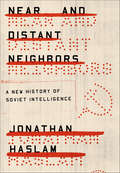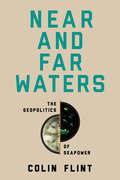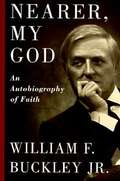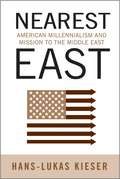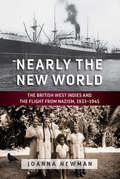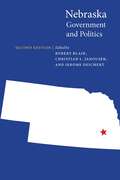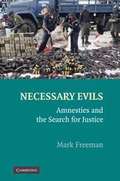- Table View
- List View
Nazi Hunter: The Wiesenthal File
by Alan LevySimon Wiesenthal spent four and a half years in Mauthausen concentration camp during World War II. With the exception of his wife, all his immediate family were exterminated, and he himself ended the war a living skeleton. Since then, he has achieved international reknown for his tireless and successful tracking down of Nazi war criminals, including notorious figures such as Eichmann, the 'desk murderer' who masterminded Hitler's Final Solution; Stangl the overlord of Treblinka; and the Mengele of Auschwitz, the dreaded 'Angel of Death'. To this day his work continues, his motivation simply expressed in the words: 'Justice, not vengeance'. This work provides an account of Wiesenthal's inspired detective work.
Nazi Ideology before 1933: A Documentation
by Barbara Miller LaneThis collection of early writings by leading Nazi intellectuals sheds light on the evolution of Nazi political thought as the party came to power. Barbara Miller Lane and Leila J. Rupp bring together a crucial yet hitherto inaccessible body of material that thoroughly chronicles Nazi ideology before 1933. It includes the extensive writings and programs published by Dietrich Eckart, Alfred Rosenberg, Gottfried Feder, Joseph Goebbels, Gregor and Otto Strasser, Heinrich Himmler, and Richard Walther Darré. Hitler&’s role in the development of Nazi ideology, interpreted here as a very permissive one, is thoroughly assessed. In commentary by the editors, the significance of each Nazi theorist is evaluated at each stage of the history of the party. Lane and Rupp conclude that early Nazi ideology was not a consistent whole but a doctrine in the process of rapid development to which new ideas were continually introduced. By the time the Nazis came to power, however, a group of interrelated assertions and official promises had been made to party followers and to the public. Hitler and the Third Reich had to accommodate this ideology, even when not implementing it. Each selection is accompanied by an introductory note and annotations which clarify its relationship to other works of the author and other writings of the period. Also included are original translations of the &“Twenty-Five Points&” and a number of little-known official party statements.
Nazi Ideology before 1933: A Documentation
by Barbara Miller LaneThis collection of early writings by leading Nazi intellectuals sheds light on the evolution of Nazi political thought as the party came to power. Barbara Miller Lane and Leila J. Rupp bring together a crucial yet hitherto inaccessible body of material that thoroughly chronicles Nazi ideology before 1933. It includes the extensive writings and programs published by Dietrich Eckart, Alfred Rosenberg, Gottfried Feder, Joseph Goebbels, Gregor and Otto Strasser, Heinrich Himmler, and Richard Walther Darré. Hitler&’s role in the development of Nazi ideology, interpreted here as a very permissive one, is thoroughly assessed. In commentary by the editors, the significance of each Nazi theorist is evaluated at each stage of the history of the party. Lane and Rupp conclude that early Nazi ideology was not a consistent whole but a doctrine in the process of rapid development to which new ideas were continually introduced. By the time the Nazis came to power, however, a group of interrelated assertions and official promises had been made to party followers and to the public. Hitler and the Third Reich had to accommodate this ideology, even when not implementing it. Each selection is accompanied by an introductory note and annotations which clarify its relationship to other works of the author and other writings of the period. Also included are original translations of the &“Twenty-Five Points&” and a number of little-known official party statements.
Nazi Occultism: Between the SS and Esotericism (Routledge Studies in Fascism and the Far Right)
by Stéphane FrançoisNazi Occultism provides a serious scholarly study of a topic that is often marred by sensationalism and misinformation. The Morning of the Magicians by Pauwels and Bergier (1960) gave rise to the idea that a secret society with wide powers, the "Thule society", was the hidden and ignored centre of Nazism. The influence of this very real small group is, however, only a fantasy, a myth. The author, a historian specializing in neo-Nazism, looks back on this speculative construction, its origins, its ideological tinkering and the practices which have succeeded in forming a sort of radical and sulphurous counterculture which has created a fascination with esotericism and Nazism and the SS. To better understand it, he also paints a portrait of some of the authors who contributed to this extremist subculture, such as the Italian esotericist Julius Evola, the Argentine anthropologist Jacques-Marie de Mahieu, Chilean neo-Nazi Miguel Serrano, and the writer Jean-Paul Bourre. This book will appeal to scholars, researchers and activists as well as general readers with an interest in the history of Nazism and the occult.
Nazi Propaganda for the Arab World
by Jeffrey HerfJeffrey Herf, a leading scholar in the field, offers the most extensive examination to date of Nazi propaganda activities targeting Arabs and Muslims in the Middle East during World War II and the Holocaust. He draws extensively on previously unused and little-known archival resources, including the shocking transcriptions of the "Axis Broadcasts in Arabic" radio programs, which convey a strongly anti-Semitic message. Herf explores the intellectual, political, and cultural context in which German and European radical anti-Semitism was found to resonate with similar views rooted in a selective appropriation of the traditions of Islam. Pro-Nazi Arab exiles in wartime Berlin, including Haj el-Husseini and Rashid el-Kilani, collaborated with the Nazis in constructing their Middle East propaganda campaign. By integrating the political and military history of the war in the Middle East with the intellectual and cultural dimensions of the propagandistic diffusion of Nazi ideology, Herf offers the most thorough examination to date of this important chapter in the history of World War II. Importantly, he also shows how the anti-Semitism promoted by the Nazi propaganda effort contributed to the anti-Semitism exhibited by adherents of radical forms of Islam in the Middle East today.
Nazi Spies & Collaborators in Britain, 1939–1945
by Neil R. Storey"...reveals the climate of fear along with the identities and case studies of suspected collaborators in key invasion areas." —ARGunners.comThe true extent of Nazi secret agent activity in Britain during the Second World War has received little attention. In large part this is due to the highly classified nature of the subject. This fascinating book uses recently released documents to explore how German agents penetrated our borders and explains methods of agent recruitment. Some spies were arrested and handed over the MI5 for interrogation. Several were turned and became ‘double-cross’ agents, while others were tried and executed or incarcerated in Camp 020 and other facilities. There were also those who came and left undetected and were only revealed after Nazi records were seized. The story, however, does not end there. While British authorities urged the public to beware of spies and posters warned ‘careless talk costs lives,’ the actual existence of Nazi collaborators in Britain was played down. Author Neil R Storey’s discovery of MI5’s and Regional Security Panels’ ‘Black Lists’ of those considered to be ‘likely to assist the enemy’ in the event of invasion reveals the climate of fear along with the identities and case studies of suspected Nazi collaborators in key invasion areas. This book is a gripping exposé of the very real threat posed by Nazi undercover operatives and collaborators in Britain during the Second World War.
Nazi War Crimes, US Intelligence and Selective Prosecution at Nuremberg: Controversies Regarding the Role of the Office of Strategic Services
by Michael SalterReviewing recently declassified CIA documents, this book provides a balanced but critical discussion of the contribution of American intelligence officials to the Nuremberg war crimes trials. Giving new details of how senior Nazi war criminals, such as SS General Karl Wolff, were provided with effective immunity deals, partly as a reward for their wartime cooperation with US intelligence officials, including Allen Dulles, former CIA Director, the author also discusses the role of such officials in mobilizing the unique resources of a modern intelligence agency to provide important trial testimony and vital documentary evidence. Nazi War Crimes, US Intelligence and Selective Prosecution at Nuremberg argues that both war crimes prosecutors and intelligence officials can engage in mutually beneficial collaborations, but that both sides need to recognize and appreciate the problems that may arise from the fact that these institutions are required to operate according to different, and in some cases contradictory, agendas. This topical book gives those studying, or with interests in, international law, criminal law and history an insight into the debates surrounding international war crimes, within the context of the Nuremberg war crimes trials.
Nazi Wives: The Women at the Top of Hitler's Germany
by James WyllieAn in-depth look at the personal lives, psychological profiles, and marriages of the wives of officers in Hitler’s inner circle: “Compelling.” —The Washington PostGoering, Goebbels, Himmler, Heydrich, Hess, Bormann—names synonymous with power and influence in the Third Reich. Perhaps less familiar are Carin, Emmy, Magda, Margaret, Lina, Ilse, and Gerda.These are the women behind the infamous men—complex individuals with distinctive personalities who were captivated by Hitler and whose everyday lives were governed by Nazi ideology. Throughout the rise and fall of Nazism these women loved and lost, raised families and quarreled with their husbands and each other, all the while jostling for position with the Fuhrer himself. Until now, they have been treated as minor characters, their significance ignored, as if they were unaware of their husbands’ murderous acts, despite the evidence that was all around them: the stolen art on their walls, the slave labor in their homes, and the produce grown in concentration camps on their tables.James Wyllie’s Nazi Wives explores these women in detail for the first time, skillfully interweaving their stories through years of struggle, power, decline, and destruction into the post-war twilight of denial and delusion.“A chilling and richly detailed group portrait of the women who married Third Reich leaders.” —Publishers Weekly
Nazis after Hitler: How Perpetrators of the Holocaust Cheated Justice and Truth
by Donald M McKaleThe stories of thirty war criminals who escaped accountability, from a historian praised for his &“well written, scrupulously researched&” work (The New York Times). This deeply researched book traces the biographies of thirty &“typical&” perpetrators of the Holocaust—some well-known, some obscure—who survived World War II. Donald M. McKale reveals the shocking reality that the perpetrators were rarely, if ever, tried or punished for their crimes, and nearly all alleged their innocence in Germany&’s extermination of nearly six million European Jews. He highlights the bitter contrasts between the comfortable postwar lives of many war criminals and the enduring suffering of their victims, and how, in the face of exhaustive evidence showing their culpability, nearly all claimed ignorance of what was going on—and insisted they had done nothing wrong. &“McKale ends the book with a haunting question: whether life would be different today if the Allies had pursued Holocaust criminals more aggressively after WWII. History buffs and students of the Holocaust will be fascinated.&” ―Publishers Weekly &“Gripping and important reading.&” —Eric A. Johnson, author of What We Knew
Nazis in the Metro
by Anna Moschovakis Didier DaeninckxA cult detective novel of anarcho-communist-fascist intrigue in late twentieth-century ParisA 78-year-old man is attacked in the basement of an apartment building in the south of Paris, brutally beaten and left for dead. Reading the story in the newspaper the next morning, Gabriel Lecouvreur--AKA private detective Le Poulpe--recognizes the victim's name as that of a once-gifted and controversial author, Andre Sloga, who had slipped into obscurity. Rumor has it that Sloga had become an alcoholic after being dropped by his publishing house.But Lecouvreur discovers that Sloga had in fact been hard at work on an explosive book exposing the scandals of a prominent industrialist and his family. Sloga's research had taken him deep into Paris's political underworld, to the place where communists and anarchists meet fascists. Plenty of characters on any side might have wanted him dead, and Lecouvreur sets himself the task of finding who among them acted on that impulse.
Nazis of Copley Square: The Forgotten Story of the Christian Front
by Charles GallagherThe forgotten history of American terrorists who, in the name of God, conspired to overthrow the government and formed an alliance with Hitler. On January 13, 1940, FBI agents burst into the homes and offices of seventeen members of the Christian Front, seizing guns, ammunition, and homemade bombs. J. Edgar Hoover’s charges were incendiary: the group, he alleged, was planning to incite a revolution and install a “temporary dictatorship” in order to stamp out Jewish and communist influence in the United States. Interviewed in his jail cell, the front’s ringleader was unbowed: “All I can say is—long live Christ the King! Down with communism!” In Nazis of Copley Square, Charles Gallagher provides a crucial missing chapter in the history of the American far right. The men of the Christian Front imagined themselves as crusaders fighting for the spiritual purification of the nation, under assault from godless communism, and they were hardly alone in their beliefs. The front traced its origins to vibrant global Catholic theological movements of the early twentieth century, such as the Mystical Body of Christ and Catholic Action. The front’s anti-Semitism was inspired by Sunday sermons and by lay leaders openly espousing fascist and Nazi beliefs. Gallagher chronicles the evolution of the front, the transatlantic cloak-and-dagger intelligence operations that subverted it, and the mainstream political and religious leaders who shielded the front’s activities from scrutiny. Nazis of Copley Square offers a grim tale of faith perverted to violent ends, and its lessons provide a warning for those who hope to stop the spread of far-right violence today.
Nazis, Islamic Antisemitism and the Middle East: The 1948 Arab War against Israel and the Aftershocks of World War II (Studies in Contemporary Antisemitism)
by Matthias KüntzelNazis, Islamic Antisemitism and the Middle East demonstrates the impact on the Arab world of Nazi ideology and propaganda in the 1930s and beyond. In 1937, with the brochure "Islam and Judaism," a new form of Jew-hatred came into the world: Islamic antisemitism. The Nazis did everything they could to anchor this new message of hate through their Arabic-language radio propaganda. The book sheds light on this hitherto unknown chapter of Germany's past. It presents new archive findings that show how the image of Jews in Islam changed between 1937 and 1948 under the influence of this propaganda and other Nazi activities. This fresh look at Middle East history allows for a more precise assessment of the present: What exactly is "Islamic antisemitism"? How is it currently manifesting itself in Germany and France? What makes it particularly dangerous? Only when we understand how strongly modern Middle East history is shaped by the aftermath of National Socialism will we be able to correctly interpret the hatred of Jews in this region and its echo among Muslims in Europe and develop adequate countermeasures. This volume will be of interest to those researching antisemitism, Nazi foreign policy and the political history of the Middle East.
Nazism as Fascism: Violence, Ideology, and the Ground of Consent in Germany 1930-1945
by Geoff EleyOffering a dynamic and wide-ranging examination of the key issues at the heart of the study of German Fascism, Nazism as Fascism brings together a selection of Geoff Eley’s most important writings on Nazism and the Third Reich. Featuring a wealth of revised, updated and new material, Nazism as Fascism analyses the historiography of the Third Reich and its main interpretive approaches. Themes include: Detailed reflection on the tenets and character of Nazi ideology and institutional practices Examination of the complicated processes that made Germans willing to think of themselves as Nazis Discussion of Nazism’s presence in the everyday lives of the German People Consideration of the place of women under the Third Reich In addition, this book also looks at the larger questions of the historical legacy of Fascist ideology and charts its influence and development from its origin in 1930’s Germany through to its intellectual and spatial influence on a modern society in crisis. In Nazism as Fascism Geoff Eley engages with Germany’s political past in order to evaluate the politics of the present day and to understand what happens when the basic principles of democracy and community are violated. This book is essential reading not only for students of German history, but for anyone with an interest in history and politics more generally.
Nazism in Syria and Lebanon: The Ambivalence of the German Option, 1933–1945 (SOAS/Routledge Studies on the Middle East)
by Götz NordbruchThe increasingly vibrant political culture emerging in Lebanon and Syria in the 1930s and early 1940s is key to the understanding of local approaches towards the Nazi German regime. For many contemporary observers in Beirut and Damascus, Nazism not only posed a risk to Europe, but threatened to take root in Arab societies as well. In the first publication to reconstruct Lebanese and Syrian encounters with Nazism in the context of an evolving local political culture and to base its analysis on a comprehensive review of Arab, French and German sources, Götz Nordbruch examines the reactions to the rise of Nazism in the countries under French mandate, spanning from fascination and endorsement to the creation of antifascist networks. Against a background of public discourses, local politics and the shifting regional and international settings, this book interprets public assessments of and contact with the Nazi regime as part of an intellectual quest for orientation in the years between the break-up of the Ottoman Empire and national independence.
Nazism, The Jews and American Zionism, 1933-1948
by Aaron BermanAaron Berman takes a moderate and measured approach to one of the most emotional issues in American Jewish historiography, namely, the response of American Jews to Nazism and the extermination of European Jewry. <P><P> In remarkably large numbers, American Jews joined the Zionist crusade to create a Jewish state that would finally end the problem of Jewish homelessness, which they believed was the basic cause not only of the Holocaust but of all anti-Semitism. Though American Zionists could justly claim credit for the successful establishment of Israel in 1948, this triumph was not without cost. Their insistence on including a demand for Jewish statehood in any proposal to aid European Jewry politicized the rescue issue and made it impossible to appeal for American aid on purely humanitarian grounds. <P><P> The American Zionist response to Nazism also shaped the political turmoil in the Middle East which followed Israel's creation. Concerned primarily with providing a home for Jewish refugees and fearing British betrayal, Zionists could not understand Arab protests in defense of their own national interests. Instead they responded to the Arab revolt with armed force and sought to insure their own claim to Palestine. Zionists came to link the Arabs with the Nazi and British forces that were opposed to the establishment of a Jewish state. In the thinking of American Zionists, the Arabs were steadily transformed from a people with whom an accommodation would have to be made into a mortal enemy to be defeated. <P><P> Aaron Berman does not apologize for American Jews, but rather tries to understand the constraints within which they operated and what opportunities-if any-they had to respond to Hitler. In surveying the latest scholarship and responding to charges against American Jewry, Berman's arguments are reasoned and reasonable.
Nazism, the Holocaust, and the Middle East: Arab and Turkish Responses (Vermont Studies on Nazi Germany and the Holocaust #7)
by Francis R. Nicosia Boğaç A. ErgeneGiven their geographical separation from Europe, ethno-religious and cultural diversity, and subordinate status within the Nazi racial hierarchy, Middle Eastern societies were both hospitable as well as hostile to National Socialist ideology during the 1930s and 1940s. By focusing on Arab and Turkish reactions to German anti-Semitism and the persecution and mass-murder of European Jews during this period, this expansive collection surveys the institutional and popular reception of Nazism in the Middle East and North Africa. It provides nuanced and scholarly yet accessible case studies of the ways in which nationalism, Islam, anti-Semitism, and colonialism intertwined, all while sensitive to the region’s political, cultural, and religious complexities.
Naïve Readings: Reveilles Political and Philosophic
by Ralph LernerOne sure fact of humanity is that we all cherish our opinions and will often strongly resist efforts by others to change them. Philosophers and politicians have long understood this, and whenever they have sought to get us to think differently they have often resorted to forms of camouflage that slip their unsettling thoughts into our psyche without raising alarm. In this fascinating examination of a range of writers and thinkers, Ralph Lerner offers a new method of reading that detects this camouflage and offers a way toward deeper understandings of some of history’s most important—and most concealed—messages. Lerner analyzes an astonishing diversity of writers, including Francis Bacon, Benjamin Franklin, Edward Gibbon, Judah Halevi, Thomas Jefferson, Abraham Lincoln, Moses Maimonides, and Alexis de Tocqueville. He shows that by reading their words slowly and naïvely, with wide-open eyes and special attention for moments of writing that become self-conscious, impassioned, or idiosyncratic, we can begin to see a pattern that illuminates a thinker’s intent, new messages purposively executed through indirect means. Through these experimental readings, Lerner shows, we can see a deep commonality across writers from disparate times and situations, one that finds them artfully challenging others to reject passivity and fatalism and start thinking afresh.
Near Dark: A Thriller (The Scot Harvath Series #19)
by Brad ThorINSTANT #1 NEW YORK TIMES AND WALL STREET JOURNAL BESTSELLER &“Fast-paced...pulse-pounding...supremely entertaining…His best ever.&” —The Washington Times &“This might be the single greatest thriller I&’ve covered....It&’s amazing!&” —The Real Book Spy Scot Harvath returns in the newest thriller from #1 New York Times bestselling author Brad Thor.The world&’s largest bounty has just been placed upon America&’s top spy. His only hope for survival is to outwit, outrun, and outlast his enemies long enough to get to the truth. But for Scot Harvath to accomplish his most dangerous mission ever—one that has already claimed the lives of the people closest to him, including his new wife—he&’s going to need help—a lot of it. Not knowing whom he can trust, Harvath finds an unlikely ally in Norwegian intelligence operative Sølvi Kolstad. Just as smart, just as deadly, and just as determined, she not only has the skills, but also the broken, troubled past to match Harvath&’s own.
Near and Distant Neighbors: A New History of Soviet Intelligence
by Jonathan HaslamA revelatory and pathbreaking account of the highly secretive world of the Soviet intelligence services A uniquely comprehensive and rich account of the Soviet intelligence services, Jonathan Haslam's Near and Distant Neighbors charts the labyrinthine story of Soviet intelligence from the October Revolution to the end of the Cold War. Previous histories have focused on the KGB, leaving military intelligence and the special service—which specialized in codes and ciphers—lurking in the shadows. Drawing on previously neglected Russian sources, Haslam reveals how both were in fact crucial to the survival of the Soviet state. This was especially true after Stalin's death in 1953, as the Cold War heated up and dedicated Communist agents the regime had relied upon—Klaus Fuchs, the Rosenbergs, Donald Maclean—were betrayed. In the wake of these failures, Khrushchev and his successors discarded ideological recruitment in favor of blackmail and bribery. The tactical turn was so successful that we can draw only one conclusion: the West ultimately triumphed despite, not because of, the espionage war. In bringing to light the obscure inhabitants of an undercover intelligence world, Haslam offers a surprising and unprecedented portrayal of Soviet success that is not only fascinating but also essential to understanding Vladimir Putin's power today.
Near and Far Waters: The Geopolitics of Seapower
by Colin FlintSeapower has been a constant in world politics, a tool through which powerful countries have policed the seas for commercial advantage. Political geographer Colin Flint highlights the geography of seapower as a dynamic, continual struggle to gain control of near waters—those parts of the oceans close to a country's shoreline—and far waters—parts of the oceans beyond the horizon and that neighbor the shorelines of other countries. A forceful and clarifying challenge to conventional accounts of geopolitics, Near and Far Waters offers an accessible introduction to the combination of economic and political relations that are the reason behind, and the result of, the development of seapower to control near waters and project force into far waters. Examining the histories of three naval powers (the Netherlands, Britain, and the United States), this book distills the past and present patterns of seapower and their tendency to trigger repercussive conflict and war. Readers will gain an appreciation for how geopolitics works, the importance of seapower in economic competition, the motivations behind China's desire to become a global naval force, and the risks of current and future wars. Drawing on decades of experience, Flint urges readers to take seriously the dilemma of near/far waters as a context for an alternative understanding of global politics.
Nearer, My God: An Autobiography of Faith
by William F. Buckley Jr.William F. Buckley, Jr., was raised a Catholic. As the world plunged into war, and as social mores changed dramatically around him, Buckley's faith -- a most essential part of his make-up -- sustained him. In highly personal terms, and with the wit and acuity for which he is justly renowned, Buckley discusses vital issues of Catholic doctrine and practice, and in so doing outlines for the reader both the nature of Catholic faith and the essential role of religious belief in everyday life.
Nearest East: American Millennialism and Mission to the Middle East
by Kieser Hans-LukasLong before oil interests shaped American interaction with the Middle East, the U. S. had a strong influence on the late Ottoman and post-Ottoman region. Covering the period from approximately 1800 to the 1970s, Hans-Lukas Kieser's compelling Nearest East tells the story of this intimate, identity-building relationship between the U. S. and the Near East. Kieser chronicles how American missionaries worked to implement their belief in Biblical millennialism, enlightened modernity, and a modern Zion-Israel. Millennialism was part of an American identity that constituted itself religiously in the interaction with and the representation of the "cradle of Zion. " As such, "going Near East" was-at least to American evangelical Protestants-in some ways more important than colonizing the American West. However, many Ottoman Muslims felt threatened by the American missionaries perceiving their successful institutions as an estranging challenge from the outside. Measuring the long twisted road from the missionary Zion-builders of the early 19th century to the privileged US-Israeli partnership in the late 20th century,Nearest East looks carefully on both sides of the relationship. Kieser uses a wide range of Ottoman, Turkish, French, German and other sources, unfamiliar to most Anglophone readers, to tell this story that will appeal to historians of all stripes.
Nearly the New World: The British West Indies and the Flight from Nazism, 1933–1945
by Joanna NewmanIn the years leading up to the Second World War, increasingly desperate European Jews looked to far-flung destinations such as Barbados, Trinidad, and Jamaica in search of refuge from the horrors of Hitler’s Europe. Nearly the New World tells the extraordinary story of Jewish refugees who overcame persecution and sought safety in the West Indies from the 1930s through the end of the war. At the same time, it gives an unsparing account of the xenophobia and bureaucratic infighting that nearly prevented their rescue—and that helped to seal the fate of countless other European Jews for whom escape was never an option.
Nebraska Government and Politics (Politics and Governments of the American States)
by Robert Blair Christian L. Janousek Jerome DeichertNebraska Government and Politics offers an in-depth examination of the connection between the political culture, traditions, and heritage of Nebraska and its governmental institutions. This new edition discusses federalism, constitutionalism, and the continuing American frontier, paying special attention to the effects and frameworks of Nebraska&’s political culture. The contributors emphasize enduring trends and issues through Nebraska&’s history as they examine the cultural foundations of the state&’s political institutions, the major governmental structures in the state, and the political and administrative relationships at play. The chapters cover periodic populism, the state constitution, nonpartisanship and direct democracy, budgeting and financial policies, the unicameral, the executive branch, local government, political culture, and capital punishment. Robert Blair, Christian L. Janousek, and Jerome Deichert provide a long view of Nebraska, a state whose unique political culture is reflected in its institutions.
Necessary Evils
by Mark FreemanThis book is about amnesties for grave international crimes that are adopted by states in moments of transition or social unrest. The subject is naturally controversial, especially in the age of the International Criminal Court. The goal of this book is to reframe and revitalize the global debate on the subject, and to offer an original framework for resolving amnesty dilemmas when they arise. Most existing literature and jurisprudence on amnesties deal with only a small subset of state practice and sidestep the ambiguity of amnesty's position under international law. This book addresses the ambiguity head on and argues that amnesties of the broadest scope are sometimes defensible when adopted as a last recourse in contexts of mass violence. Drawing on an extensive amnesty database, the book offers detailed guidance on how to ensure that amnesties extend the minimum leniency possible, while imposing the maximum accountability on the beneficiaries.
